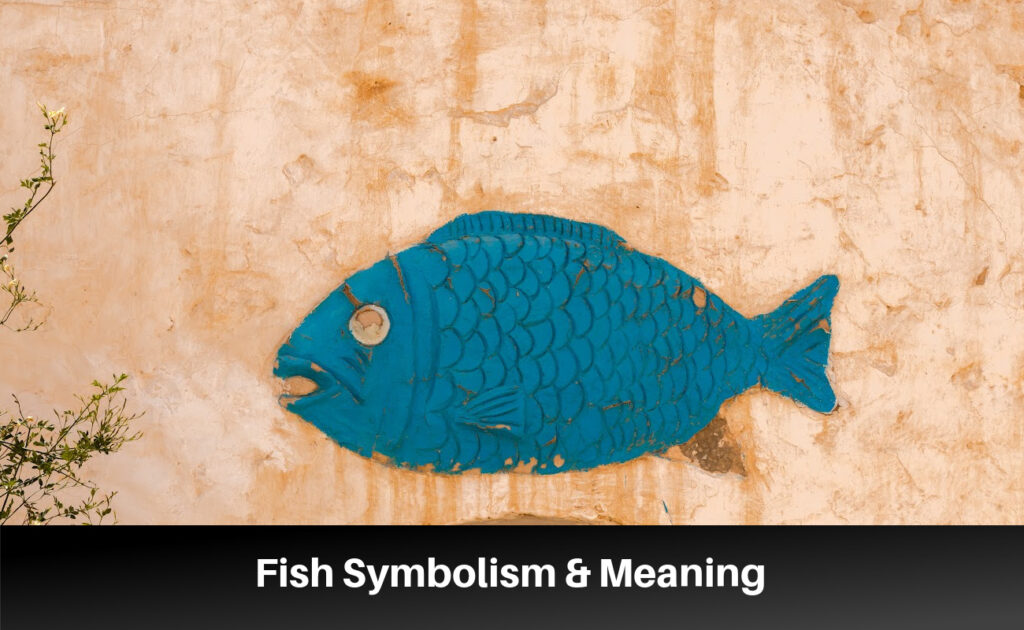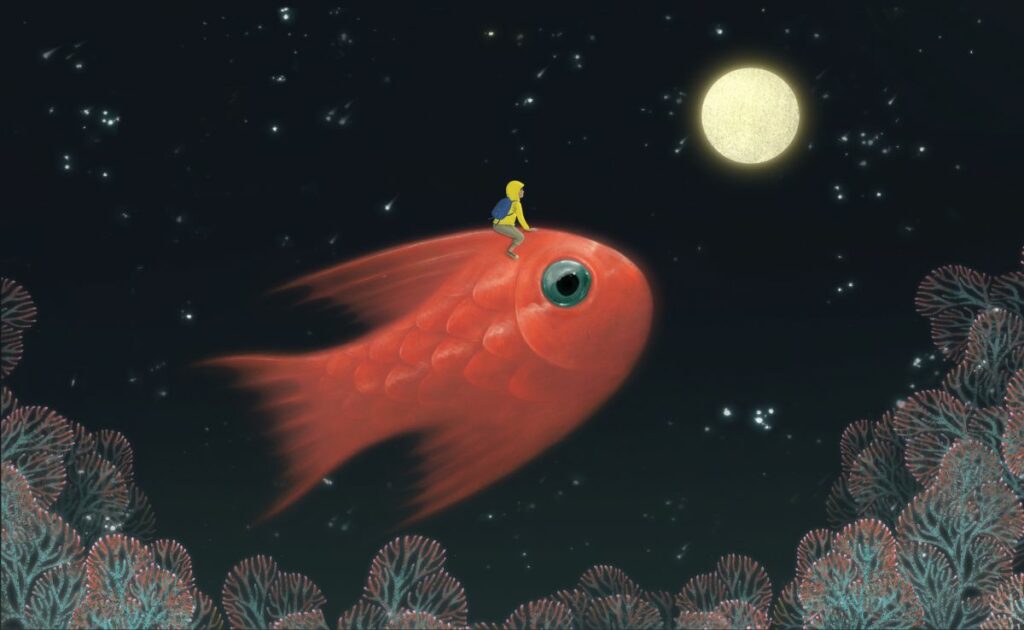Fish symbolism has existed for as long as there have been people around to think about them. Fish have been a source of food since prehistoric times. And a source of wonder for people who saw how their lives were tied to the aquatic bounty.

In many cultures, animals are seen as akin to people. They may think, desire, and see the world in very different ways. But they are our peers and live rich lives of their own. The world of water then becomes a spiritual realm where men can’t visit for long. Fish act as guides and intermediaries to the strange spirits that inhabit this world.
Some of the oldest fish symbols are in the Abri du Poisson Cave in Dordogne, France. The cave contains relief sculptures that were carved around 23,000 B.C. They depict salmon, an essential food source for Ice Age people.
As world cultures advanced in technology and thought, fish started to take on abstract and even spiritual meanings.
The Spiritual Meaning of Fish
Fish sustain us when we eat them as food. But they are also a source of spiritual nourishment. One spiritual meaning of fish that endures today is the Zodiac. Western astrology has its roots in Greek traditions, who in turn, inherited them from the Babylonians. Pisces is the twelfth and final sign of the Zodiac.
Fish symbolism abounds when you read the descriptions for one. People born under this sign tend to be as mutable as water. Flowing and creative in thought process, a Pisces is sensitive and intuitive. In modern astrology, a Pisces is ruled by the planet Neptune, which is named after the Roman god of the seas.
Cultures the world over recognize fish as symbols of fertility. No vertebrate animal lays more eggs at a time than fish. Some fish lay as many as 100,000 eggs per spawning. Fish symbols also extend to the idea of freedom. Fish wander the lakes and seas, places with no real borders or boundaries.
Fish Symbolism in Greek Culture
Fish symbolism is easiest to detect in the Greek world since it has more direct roots to modern Western culture. One example is the word “delphys,” which means both fish and womb. A delphos (dolphin), for example, is a fish with a womb.
The symbol for both was embraced by Christianity. Yet your Jesus fish tattoo may have more meaning than you think. It is a pagan symbol that predates the Christian religion. The overlapping twin crescent moons are a fish symbol at first glance. But also tell the story of a woman’s monthly cycle.
Fish and the feminine come together again in the Greek myth of Ichthyes. These were two large fish that rescued Aphrodite, goddess of beauty, and Eros, god of love, from the monster Typhon.
Japanese and Chinese Fish Symbolism
The symbolism of the fish is direct in Chinese culture. It starts with the word for fish, which is pronounced Yú (魚). The word is similar sounding to the terms for affluence, wealth, abundance, and jade. The ancient Chinese took this symbolic meaning of fish in mind when they domesticated goldfish, gold barbs, and golden Asian arowanas.
The Chinese also hold a spiritual meaning of fish through the patron bodhisattva Guanyin. One of her depictions is of a woman holding a basket of fish. She is the patroness of fishermen and many in Fujian would pray to her for a safe journey in rough seas. Guanyin is also associated with water, both the home of fish and a traditional symbol for void or emptiness.
The Japanese people hold different views. Instead of goldfish they bred koi carp. Koi are seen as symbols of not just prosperity but also perseverance in the face of adversity. As the fish leap up waterfalls to spawn they keep trying even as they are driven back by the flow of life.
Koi fish symbolize courage and loyalty as well to the Japanese. These traits made them ideal fish symbology for samurai.
Koi fish symbology even extends to them being part of the nation of Japan’s identity. There are few things seen as more traditionally Japanese than a well maintained garden with a koi pond.
Fish Symbolism in Native American Culture
The indigenous cultures of North America are a diverse group. Fish hold all kinds of meanings. They are seen as harbingers of abundance, water beings with their own intelligence, and more. Some tribes have clans whose patron animal is a fish, including the Giigoonh of the Ojibwe people.
The Menominee people of Wisconsin told stories of the Big Sturgeon (Mashe-Namak). The fish was a monster that was killed by a hero of their people. Sturgeons do grow large but are harmless to people. They are also a source of food and skins for northern people around the world. So it’s not surprising they loom large in the collective imagination.
Some First People revere carp or catfish while others tell stories or name themselves after eels or halibut. Salmon are essential to the livelihood of many tribes in the Pacific Northwest. Salmon dances celebrate the start of the spawning season, where the fish migrate by the millions to their breeding grounds. In these cultures, salmon are symbols of prosperity, determination, and renewal.
The Kwagiulth people of British Columbia, Canada, believe that twins are a gift of the Salmon People to a mother. Therefore, only twins are allowed to perform the Salmon Dance.
Salmon, halibut, and even starfish find their places as carvings on wooden fish totem poles. Here they become symbols of clan membership and reminders of legends.
Symbolic Meaning of Fish in African Culture
Africa is a big place so the symbolism of fish is diverse. One ancient example of fish in meaning is the “abtu,” a sacred fish associated with the goddess Isis. In transforming into one, Isis was often referred to as “the Great Fish of the Abyss.” Part of an Egyptian prayer even attributes the success of a fisherman to Isis’s blessings.
Many modern cultures revere the tilapia, a cichlid fish that is raised around the world as food but has its roots in Africa. The rainbow hues of a live tilapia are associated with sunrise and gods of the sun. And like most cichlids, tilapia care for their eggs and fry. The protective gesture increases their value as a family sustaining source of food.
The Nile perch, on the other hand, is a less positive symbol. These large fish are sought after as food throughout the Nile river valley. But its dark colors, cannibalistic habits, and predatory nature make the Nile Perch a symbol for destruction in Egypt and Sudan.
The Mandinka people of southern Mali give fish symbolic meaning through their creation story for the world. The creator god, Mangala, planted goosegrass seeds into the cosmic womb. Each group of seeds became the four directions, the four elements, the opposite sexes, and so on.
The first people were twins; and the first born of the two caused chaos through his desire to dominate and rule the world. His sibling, Faro, sacrificed himself to make up for his brother’s crimes. Before doing so, Faro assumed the form of twin fish.
What is the Spiritual Meaning of Fish in a Dream?

Fish captivate us in the waking world but are also potent symbols in our dreams. Here, the context that you encounter the fish in is just as important as the fish itself.
A fish out of water might be a symbol for a difficult situation that is around the corner. Is the fish a koi carp? If so, then the dream could indicate that taking a chance on being uncomfortable will lead to a big financial reward.
A dead fish, on the other hand, may indicate a pitfall or other situation to be avoided. There is little to no chance of success here. Since fish represent abundance, prosperity, perseverance, and opportunity, we never want to see a dead fish in our dreams.
Eating a spirit fish in your dreams is the best symbol you could ask for. There is a major blessing lined up in your future.
Remember that the prophetic meaning of fish is not always easy to determine since fish symbolism is culturally dependent. What one culture considers a good omen might mean bad luck or even death for another. What do fish mean for your culture?
Conclusion
Even if you consider yourself a rational, non-superstitious person, you’ve already been deeply influenced by the symbolism of a fish. They are too important to people and cultures around the world. Fish symbolism finds its way into our ancient and modern songs, myths, money, clothes, and even our tattoos.
FAQs
The fish is the second most common Christian symbol after the cross itself. The fish symbol is based on a Greek acronym for Jesus Christ. To make the point clearer, some Christian fish symbols include the Greek letters inside or under the fish. Fish also appear in the Bible when Jesus provides fish for his Disciples in Luke and John. The feeding of the five thousand and the four thousand in Matthew also involved fish lunches. In the Bible, fish are a symbol of prosperity and abundance.
Fish symbolize the unconscious in Jungian psychology. These are the deeper layers of the mind that our higher, rational functions aren’t conscious of. They are like black waters that hide memories of the past and other influences that extend into the present without our awareness.

